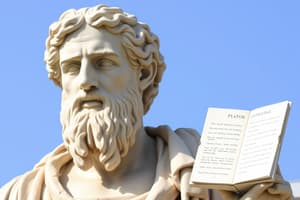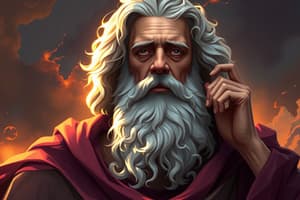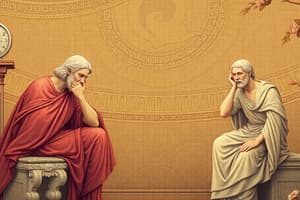Podcast
Questions and Answers
What is the central question discussed in Plato's dialogue with Ion?
What is the central question discussed in Plato's dialogue with Ion?
- Whether Socrates understands Homer better than Ion
- Whether rhapsodes perform due to skill and knowledge or divine possession (correct)
- Whether Ion's knowledge of Homer is limited to only himself
- Whether Ion's performance at the festival of Asclepius was well-received
According to Socrates, why does Ion's claim of understanding Homer better than anyone alive seem puzzling?
According to Socrates, why does Ion's claim of understanding Homer better than anyone alive seem puzzling?
- Because Ion has just come from a festival of Asclepius
- Because Ion is divinely possessed
- Because Socrates believes that Homer treats many of the same subjects as other poets like Hesiod (correct)
- Because Ion is a specialist like a doctor
What does Socrates deduce about Ion's skill from his observation about Homer and other poets?
What does Socrates deduce about Ion's skill from his observation about Homer and other poets?
- Ion has a unique skill that surpasses that of other rhapsodes
- Ion's skill is limited to subjects like war and divination
- Ion has no real skill and is divinely possessed like a prophet (correct)
- Ion's skill is comparable to that of a specialist like a doctor
What does Socrates assert about the nature of poetic inspiration in the dialogue?
What does Socrates assert about the nature of poetic inspiration in the dialogue?
According to Socrates, why does God take away the mind of certain men?
According to Socrates, why does God take away the mind of certain men?
What metaphor does Socrates use to explain how the rhapsode transmits the poet's original inspiration?
What metaphor does Socrates use to explain how the rhapsode transmits the poet's original inspiration?
What does Ion claim inspires his deliberate disconnection from reality?
What does Ion claim inspires his deliberate disconnection from reality?
According to Ion, what cannot be specifically referred to in Homer's poetry?
According to Ion, what cannot be specifically referred to in Homer's poetry?
What does Socrates accuse Ion of being?
What does Socrates accuse Ion of being?
In what context does the idea of divine madness hold significance for Socrates?
In what context does the idea of divine madness hold significance for Socrates?
Flashcards
Ion's Central Question
Ion's Central Question
Rhapsodes perform due to divine possession, not skill or knowledge.
Socrates' Puzzle
Socrates' Puzzle
Socrates is puzzled because Homer covers similar subjects to poets like Hesiod.
Ion's 'Skill'
Ion's 'Skill'
Ion's skill is not real; he is divinely possessed, similar to a prophet.
Poetic Inspiration
Poetic Inspiration
Signup and view all the flashcards
Divine Takeover
Divine Takeover
Signup and view all the flashcards
Magnet Metaphor
Magnet Metaphor
Signup and view all the flashcards
Ion's Incentive
Ion's Incentive
Signup and view all the flashcards
Protean
Protean
Signup and view all the flashcards
Study Notes
Plato's Dialogue with Ion
- The central question discussed in the dialogue is the nature of poetic inspiration and the skill of a rhapsode, Ion.
Ion's Claim and Socrates' Response
- Ion claims to understand Homer better than anyone alive, but Socrates finds this puzzling because Ion is not skilled in other areas of poetry.
- Socrates deduces that Ion's skill is not due to his knowledge or technical expertise, but rather due to a divine inspiration.
The Nature of Poetic Inspiration
- According to Socrates, poetic inspiration is a form of divine madness that takes away the mind of certain men.
- Socrates asserts that poetic inspiration is not a product of human skill or wisdom, but rather a gift from the gods.
The Role of the Rhapsode
- Socrates uses the metaphor of a magnet to explain how the rhapsode transmits the poet's original inspiration to the audience.
- Ion claims that his deliberate disconnection from reality is what inspires him to perform Homer's poetry.
Ion's Understanding of Homer
- Ion claims that Homer's poetry cannot be specifically referred to or understood in a rational or analytical way.
Socrates' Accusation
- Socrates accuses Ion of being a mere vessel or mouthpiece for the poet's inspiration, rather than a true artist or expert.
Divine Madness
- The idea of divine madness holds significance for Socrates in the context of understanding the nature of poetic inspiration and the role of the rhapsode in transmitting that inspiration.
Studying That Suits You
Use AI to generate personalized quizzes and flashcards to suit your learning preferences.




